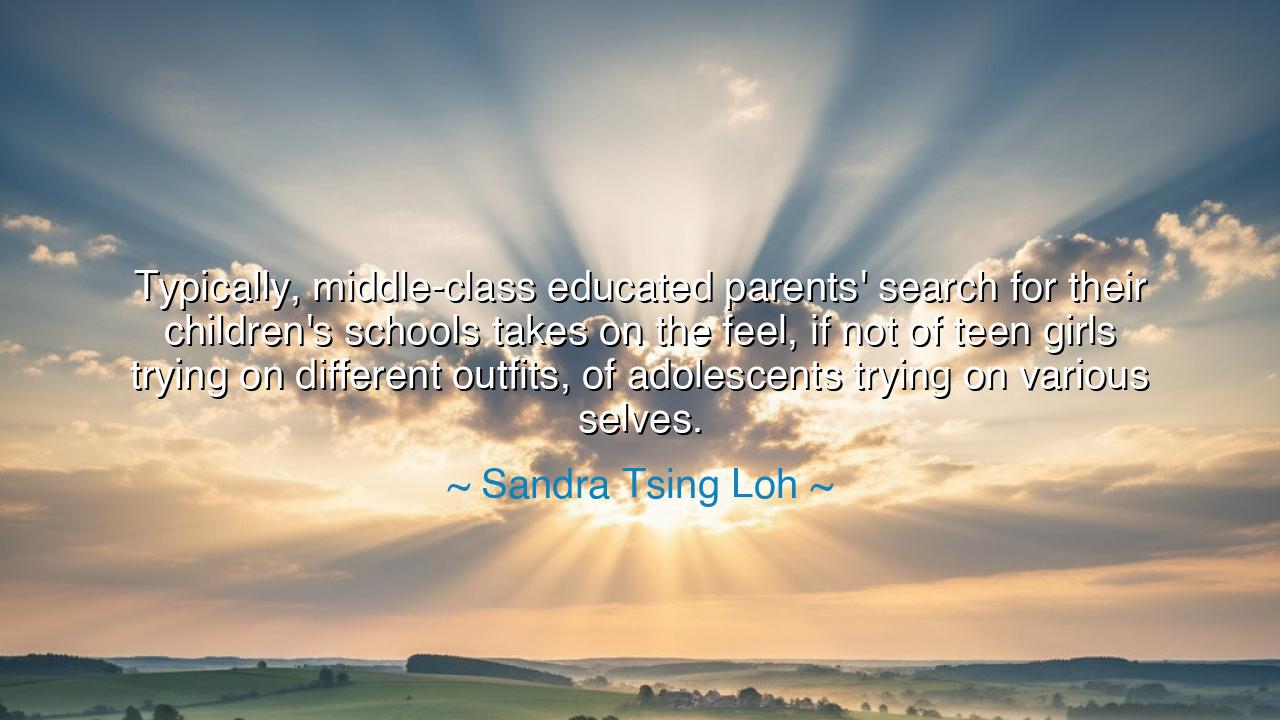
Typically, middle-class educated parents' search for their
Typically, middle-class educated parents' search for their children's schools takes on the feel, if not of teen girls trying on different outfits, of adolescents trying on various selves.






Sandra Tsing Loh, with wit sharpened by truth, declared: “Typically, middle-class educated parents' search for their children's schools takes on the feel, if not of teen girls trying on different outfits, of adolescents trying on various selves.” Beneath this lively comparison rests a profound observation about the anxieties of modern parenthood. In the quest to find the "perfect school," parents become like adolescents again—uncertain, restless, trying on different identities, yearning to belong, and fearing rejection. What should be a choice of education becomes entangled with status, self-image, and hope for the future.
The origin of this truth lies in the cultural landscape of competitive education. Among the middle classes, schools are not seen merely as places of learning but as gateways to destiny. The parent, in seeking a school for their child, is in fact also seeking a mirror—a reflection of their own values, ambitions, and even fears. Just as the adolescent experiments with clothing to discover who they are, the parent experiments with schools to project who they wish their child—and perhaps themselves—to become.
The comparison to teen girls trying on outfits is both humorous and revealing. For what are clothes but symbols of identity? Adolescents try on leather jackets, uniforms, or bright dresses to ask, “Am I rebellious, disciplined, or free-spirited?” Likewise, parents try on public, private, charter, or magnet schools, wondering, “Am I ambitious, practical, alternative, or elite?” This restless searching shows that the act is not simply about education—it is about self-definition and belonging.
History, too, provides us with examples of education as a mirror of identity. In ancient China, the imperial examination system determined not only a child’s future but also a family’s standing. Parents would pour their hopes into their sons’ schooling, often sacrificing much to secure a teacher or tutor. In these choices, the family’s honor was reflected, just as today’s parents see themselves reflected in their child’s school crest or reputation. The weight of identity bound to education is not a modern invention; it is an old pattern wearing new clothes.
But Loh’s words also carry warning: that in this frantic search for the “right” school, the child’s individuality can be overshadowed. Just as a teenager lost in mirrors may forget their true face, so parents may become so obsessed with image and outcome that they forget the essence of education: to awaken curiosity, discipline, and compassion in a soul. To choose only for prestige or appearances is to dress a child in garments that may not fit their true form.
The lesson for us is clear: schools, like clothing, are tools, not identities. A garment may shape appearance but cannot change the essence of the wearer; so too, a school may offer opportunities, but the spirit of the child must be nurtured by love, attention, and wisdom at home. Parents must guard against projecting their own anxieties and instead ask: “What environment will allow my child’s true self to flourish?” For no school can substitute for guidance, patience, and integrity in the home.
Practical wisdom flows from this teaching. Parents should research, yes, but without losing perspective. Visit schools with openness, not fear. Seek not the most prestigious, but the most fitting. And remember that education is a lifelong garment—if the early fabric is plain but sturdy, it may serve the child better than silks that dazzle but unravel. Above all, remember that identity belongs to the child, not the institution.
So, children of tomorrow, hear this: do not let the world convince you that worth lies in a crest or name. And parents, do not let fear turn your search for schools into an endless costume change. As Sandra Tsing Loh reminds us, this restless trying-on is natural, even human—but wisdom lies in seeing beyond image to essence. For the true work of education is not to clothe a child in status, but to awaken in them the courage to walk in their own skin, unashamed and free.






AAdministratorAdministrator
Welcome, honored guests. Please leave a comment, we will respond soon